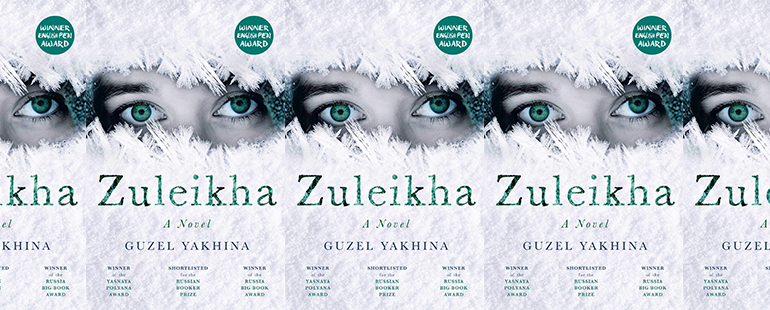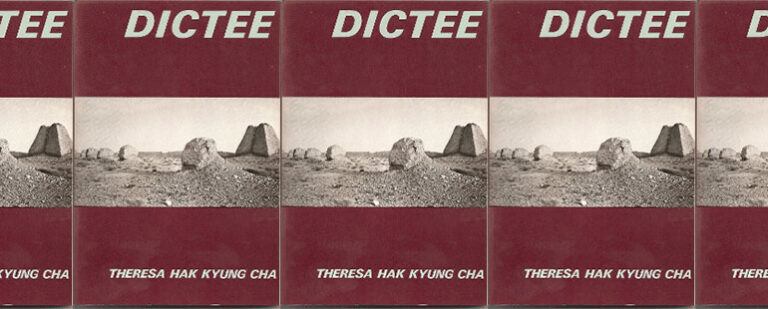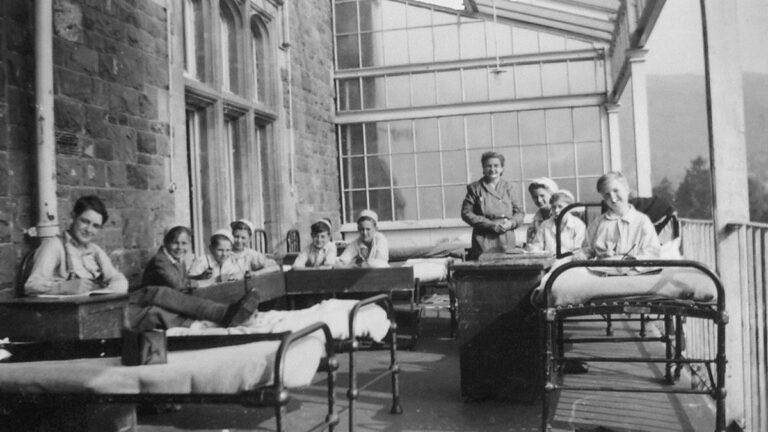Zuleikha Opens Her Eyes

When the novel Zuleikha appeared in Russia in 2015, its young debut author, Guzel Yakhina, was met with instant acclaim. A work of historical fiction, Zuleikha tells the story of its titular character, a Tatar woman, who is exiled to the Siberian wilderness for the crime of being a “kulak,” or relatively wealthy peasant. Recently translated into English by Lisa C. Hayden, Zuleikha’s Russian title translates literally as “Zuleikha Opens Her Eyes.” This phrase, repeated several times throughout the novel, underscores the central irony of the narrative: despite the fact that she is being repressed by the state, Zuleikha’s exile actually allows her to expand her horizons beyond the small village and traditions that have confined her.
The history in Zuleikha is likely to be unfamiliar to English-language readers, except perhaps through the work of Aleksandr Solzhenitsyn, and Zuleikha offers an opportunity to learn about a tumultuous period in Soviet history while reading an enjoyable and fast-paced narrative. The campaign of Dekulakization carried out in the USSR during the first five-year plan was set in motion by Stalin to break the back of the peasantry, allowing for the redistribution of agricultural land into collectivized farms. A vast propaganda campaign featured the kulak (literally, “fist” in Russian) as an “enemy of the state” clinging to private property. From 1930 to 1931, over 1.5 million people were deported to the Far East.
Yakhina, who studied screenwriting and originally imagined the novel as a film, writes about these events in a highly visual, fast-paced style. In the novel’s first chapter, Yakhina gives us a painstaking description of a day in Zuleikha’s life, which is spent, from morning to night, caring for her husband, Murtaza, and her mother-in-law, whom she has dubbed “The Vampire Hag.” The Vampire Hag, in turn, calls her the “Pitiful Hen.” Zuleikha cannot read or write and has never left the confines of the small village that she lives in, not even to travel to the nearest city of Kazan. When she is almost lost in a snowstorm while collecting firewood, her husband Murtaza treks to the woods to find her, and she is both surprised and grateful, assuring herself that her husband is a good man. The reader, meanwhile, watching as Murtaza verbally berates, beats, and rapes her, is unlikely to agree. Exhausted, treated not unlike the family’s horse, Zuleikha falls asleep standing up while trying to prepare her mother-in-law’s bath. She has given birth to four daughters, none of whom lived more than a month. Her sole act of agency consists of sneaking into the attic to steal a sweet treat from the family’s foodstuffs, which she takes to her daughters’ graves, hoping to please the spirit that she believes resides in the cemetery. Zuleikha’s grief over her lost children suffuses the novel’s early pages and her worldview is sadly resigned toward the life circumstances she has grown accustomed to, “just as an ox grows accustomed to a yoke and a horse to its master’s voice.”
The novel’s plot is set in motion with the arrival in the village of a group of Red Army soldiers. When Murtaza refuses to give them the family’s grain stores, he is shot dead by the Russian Commander Ignatov. Zuleikha is soon packed on a crowded train with a group of other kulaks and her blind and deaf mother-in-law, deemed too old to survive the journey, is left behind to die. In Yakhina’s novel, the perilous nature of the journey is shown in a lengthy section recounting months spent on the train:
They bury the dead along the tracks in one common pit. They dig it themselves using wooden shovels, with the escorts’ guards rifles aimed at them. Sometimes they don’t have enough time to finish digging graves or cover the corpses properly with crushed stone before the order “To the train!” booms. The bodies are left to lie in the open, with the hope that kind people will turn up on the next special train and scatter something over them. They themselves always scatter something when their train stands by open graves like that.
Of the over eight hundred “enemies of the people” originally on Zuleikha’s train, only about half survive the train journey. Most of the remaining survivors drown when the boat they are taking down the river into the Siberian wilderness sinks, leaving only a dozen people alive, including Zuleikha and Ignatov.
Finding themselves alone in a vast wilderness with dwindling supplies, the survivors work quickly to build an underground house so that they may survive the winter. Zuleikha, who discovered she was pregnant during the train journey, gives birth to a son, Yuzuf. Zuleikha had been convinced the child would not survive and contemplated committing suicide with a lump of poisoned sugar, but after her son’s birth, she finds a renewed reason to live, determined for him to survive. Zuleikha’s will to live at this point in the novel is clearly tied to fulfilling her role as a mother. She also forms friendships with several of the other exiles, members of the intelligentsia from Leningrad, and a gifted doctor from Kazan who later takes her on as a nurse.
As time speeds up in the novel’s second half, readers witness the growth of this small outpost in the wilderness into a functioning labor camp, with Ignatov serving as commandant. Zuleikha discovers that she is a talented hunter and is assigned to the camp’s hunting detail, one of the most prestigious of the labor camp positions and a duty she balances with caring for her growing son. When a long-smoldering attraction between Zuleikha and Ignatov turns into a passionate affair, Zuleikha has to reconcile her traditional beliefs with her new, more secular worldview, and she discovers how much her experiences have changed her: “She’s not ashamed. Everything she was taught and learned by rote as a child has left her, gone away. What’s new and has come in exchange has washed away the fears, just as a flood from melting snow washes away last year’s twigs and decayed leaves.” It’s only when she comes to see the affair as a threat to her son’s safety that she ends it, despite being broken-hearted. The novel ends with Yuzuf’s departure at sixteen to become an artist in St. Petersburg. Zuleikha’s grief at his move is softened by the knowledge that she can now be with Ignatov, both of them not yet fifty, but prematurely aged by the hardness of life in the labor camp.
The final line of the novel hints at the contradictions in Zuleihka’s journey. Yakhina writes, “while the pain that fills the world hasn’t gone, it has allowed her to breathe.” Inasmuch as the physical circumstances of her life remain largely outside of her control, Zuleikha’s transformation over the course of the novel is an inner one. From a person with no sense of independent worth outside her ability to serve her husband, Zuleikha has grown into an individual with an awareness of her own talents, a mother who is able to let go of her son so that he can realize his own potential, and a woman able to be an equal partner in a romantic relationship of her choosing.
When asked in an interview whether she sees Zuleikha as a feminist novel, Yakhina allowed that, “It’s a novel about a woman who acquires new strength. It’s a novel about the metamorphosis of a woman. You can call it feminist, be my guest.” Yakhina based the character on her grandmother, who also was deported from Tatarstan under Stalin, and whose life, like Zuleikha’s, was, in paradoxical ways, enriched by her forced travels. Western critics might bristle at calling Zuleikha a feminist work, as Zuleikha so often conceives of her own identity in relation to the men around her. She is perhaps most self-realized when she discovers her talent for marksmanship and takes Ignatov as her lover, yet she ultimately subordinates her own desires to the demands of motherhood. But the novel is perhaps most interesting when it grapples with the contradiction between Zuleikha’s budding self-awareness and her commitments to others. This is a different sort of feminism, one that makes room for the relational self rather than insisting on the dictates of radical individualism—and one that feels truer perhaps to both Russian and Tatar culture.
Zuleikha is both a satisfying work of historical fiction as well as a moving portrait of a difficult historical period. Its most surprising element is also its most paradoxical. Yakhina’s novel, perhaps in spite of its author’s intentions, posits a woman whose life is expanded and even enriched while being repressed by the state. Zuleikha’s deportation frees her in some ways from the constraints of a traditional Tatar woman’s life—even as she remains very much a prisoner.
This piece was originally published on November 6, 2020.


